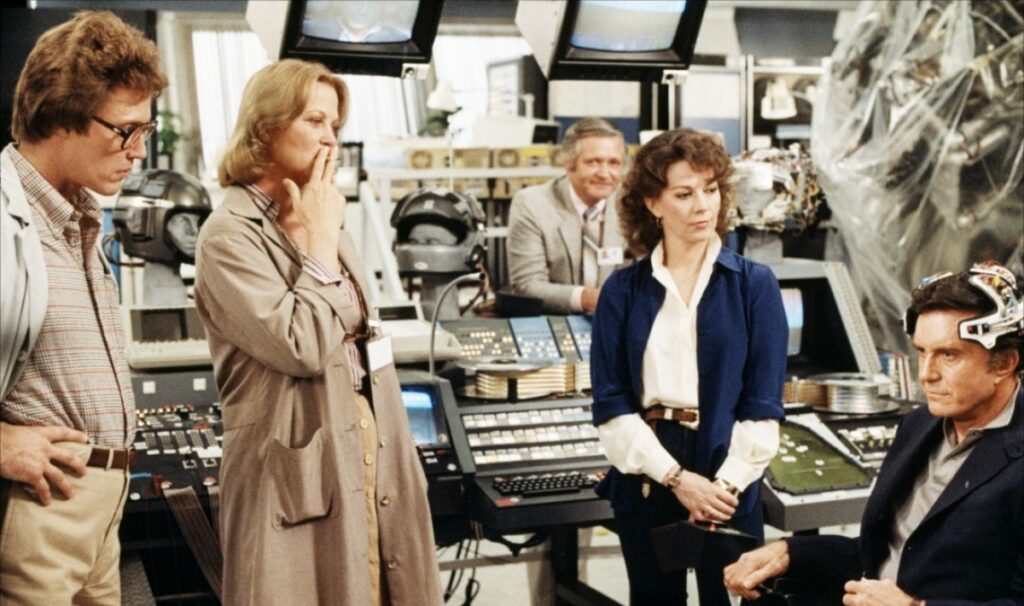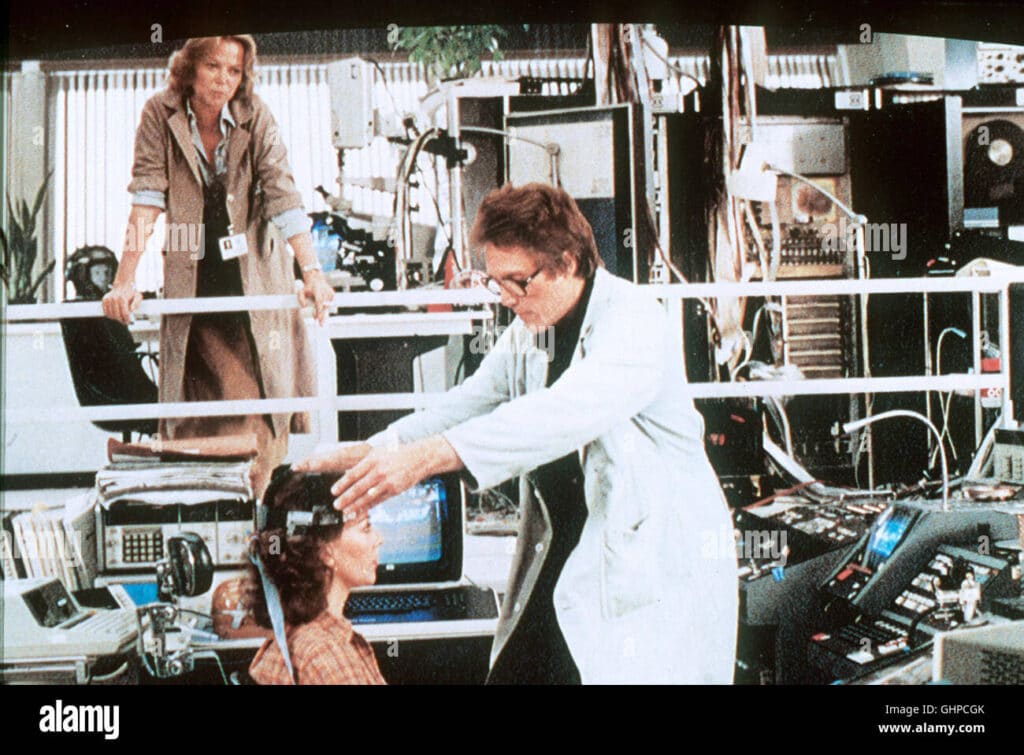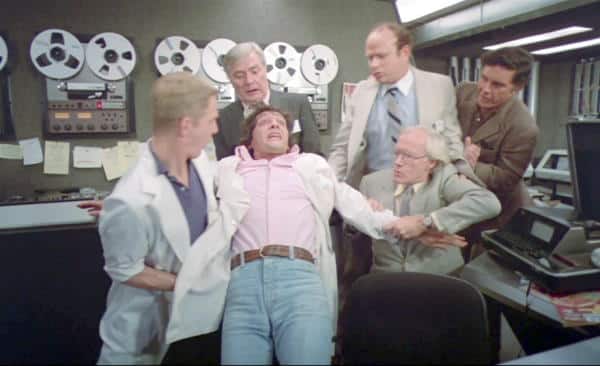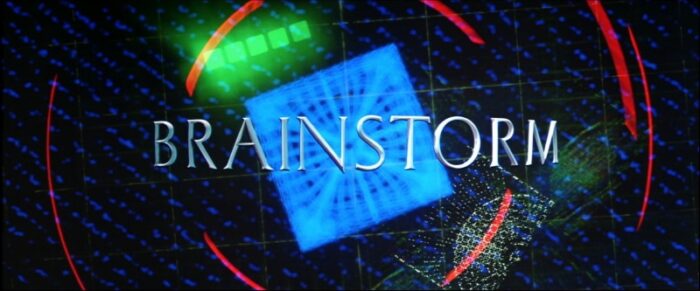Douglas Trumbull directed the science fiction psychological thriller Brainstorm in 1983. The story of the movie centres on a team of scientists who develop an immersive tool that lets one experience the memories of another person. The ideas in this movie are brilliant, and the whole thing is much ahead of its time. Leading actors in the movie include Christopher Walken, Natalie Wood, Louise Fletcher, and Cliff Robertson. This movie is fantastic if you want to catch up on some older movies. Spoilers ahead for the 1983 film Brainstorm’s narrative and conclusion.
Suni Sanchez suggested this movie to me, and after I watched it, we had a great discussion. This essay is a recapitulation of our exchange.

Responses to the Important Issues Raised by the Film: Brainstorm
Movie Idea Generator| The Premise
Scientists Michael and Lillian are developing a tool that allows one person to experience being in the mind of another. They rejoice when they reach their first round of success. The milliary department known as “the party-poopers” has been sponsoring them and is eager to turn the innovation into a weapon. That their CEO, Alex, is cool with this awful plan disgusts Lillian to her core. As one could anticipate, this results in a tug of war with numerous internal and external conflicts. But, Brainstorm is not a science fiction movie that only focuses on the struggle for dominance. This movie has a lot of layers.

The lead researcher, Lillian, and Michael are now dating, and Michael’s marriage to Karen is about to collapse. The tool allows for both witnessing and feeling another person’s memories. Similar to the Point-Of-View rifle from Hitchhiker’s Guide to the Galaxy, it sparks a new romance between Michael and Karen. Lillian, who had been struggling with severe anxiety, passes away after a heart attack. She wears the device until she passes away, leaving a recording of her death experience behind.
As Alex kicks Michael out of his lab for disobeying, Michael is left with two objectives: to be the first person to experience death, the thing that most people fear the most, and to make sure the technology never ends up in the hands of the military (Project Brainstorm). He succeeds in doing it with the aid of his wife and friends.
These are some of the important queries that Brainstorm poses (and Suni).

What really happened to Hal, the person who ripped and stole the “porno” experience?
In my opinion, Hal had a unique human ecstasy experience. Hal looped and extracted orgasm, which led to sensory overload. Hal didn’t enjoy the fantasy or the girl, but he felt like a different man after the experience. He came to see that he was simply not perceiving the beauty in his life, despite it being there. He is Awake, to use today’s language!
To see the positive side of things, all it takes is a little perspective. Hal’s recurring orgasms were his version of a near-death experience, which is when this happens for some people. But in both instances, it’s the mental experience rather than the physical occurrence.
What what transpired to Michael’s son after watching that spooky recording? Why did that cause him to experience a severe psychotic episode?
While torturing someone psychologically, the military department made that recording in secret. The child’s psyche was tormented psychologically while he was wearing the headpiece. Fortunately, Michael arrived in time to free him. The fact that the child only witnessed the incident for a brief period of time prevented him from losing consciousness kept him alive.

Why did Michael miss out on his son’s experiences?
It happened because the child was too young to know how to remove the headset. Mike was quick to take off the headset when he first saw the recording of torture since he has seen numerous records and has adequate mental control to do so.
Who made the torture recording, as a project?
It was a military recording designed to allow soldiers to physically harm others while torturing them indescribably. They turned the technology into a weapon in order to mass-torture captives, spies, and anybody else they wanted to learn information from. This was designated Project Brainstorm.
Michael could not possibly have experienced death. In the film, we can tell that several settings have been altered, but which ones?
Heart failure caused Lillian’s death. This indicates that while her brain was functioning normally, her heart stopped pumping blood, which resulted in an overload of her repertory system because the lungs are responsible for supplying oxygen to the blood that the heart keeps in motion.
By cutting off his heart and lungs from the machine, Michael was able to simply experience what Lillian’s mind went through, without his body reacting in the same manner that it did, which led to her death. The second scientist, Gordy, failed to do this and had a full-blown heart attack, just like Lillian had. Hence, Gordy perishes.

How was it possible for Michael to still see things despite the loss of other bodily functions?
Michael is only experiencing what Lillian did, undisturbed by what Lillian did to the rest of his body; there are no visuals involved. But even that ultimately proved to be dangerously close to lethal since Michael’s mind started to fall into a coma.
In my perspective, the final death experience wasn’t simply beautiful; it also served to illustrate a point: that after we pass away, we return to the stars (the cosmos)?
I think the experience was portrayed as beautiful since the film didn’t make death sound like the worst thing that could happen. In light of the negative impression it would have left, it wouldn’t have been good for the movie. Michael also has this happy expression on his face that suggests he is eventually having a great experience.
After Brainstorm ends, does Michael reach the stars or anything further?
Going up seems to be a metaphor for ascending to the heavens and among the stars in the movie Brainstorm. The equipment captured Lillian’s mental experience, which is her brain’s perception of death rather than a general truth about death.
If Karen hadn’t phoned him back, would Michael have gone somewhere else?
The body cannot survive without the mind, as seen in the film The Matrix. So certainly, Michael would have embraced death and turned into a vegetable with his intellect lost in a digitally induced coma had Karen not called out to him.
Did he indeed have an encounter of the afterlife through the heart attack like Lillian had? Or was that his personal account of a subjective event?
Instead of Michael’s, I think Lillian’s perspective was correct. He simply witnessed what she went through. Regrettably, when the time comes, Mike might just fade away like a light.
What did Lillian want to achieve with this thing? What would have been her ideal usage if she hadn’t wanted it to be militarised or utilised for the sex industry?

I assume Lillian wanted the invention to be utilised for peace. This is a point-of-view machine, so if one leader could understand the viewpoint of the other, they could just understand one another.
Alex repeatedly says “breakthrough in communication” in his opening remarks. that spoken communication is not the only form of expression available to mankind. Alex always brought up it, and Lillian loved it. Hence, I believe it is reasonable to presume that she agreed with him.
What moral standards apply when the military personnel choose what to use with a device like that? Really, whose invention is it?
Although Alex is the CEO, the military would like to fund the study, so they would have a voice in how it is conducted. Alex sets up a backdoor for the military to monitor and progress their own study based on Michael and Lillian’s work because his primary researchers, however, are not in accord. It appears that the ethics were abandoned as soon as they arrived on the site.
Explanation Brainstorm Movie Ending
In the film’s climactic scene, Michael is seen effectively reliving Lillian’s final moments. Lillian believed that after dying, she would soar to the stars. Michael’s mind was about to enter a digital coma when Karen called out to him and reminded him of his commitment to not leave her ever again. Additionally, they successfully hack into the lab and wipe out everything, preventing the technology from becoming militarised.
What did you think of Brainstorm’s storyline and climax? Please post your thoughts and inquiries here.
ALSO READ THIS: Limitless (2011) Film Explained
